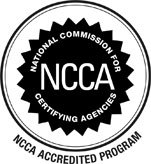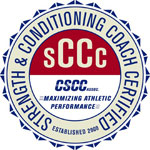


The NCAA passed legislation that went into effect on August 1, 2015 requiring that all Division I full-time strength and conditioning coaches be certified by an accredited certification. This legislation was passed with the goal of protecting the health and safety of the student athlete by ensuring that the individuals developing and implementing the strength and conditioning programs of these athletes are qualified to do so. The National Commission for Certifying Agencies (NCCA), the accrediting body of the Institute for Credentialing Excellence (ICE), is an organization which evaluates certifications and determines whether or not the certifying body and the certification itself meet specific standards. The value of having an accredited certification is that an objective third party organization has examined the procedures and policies of the certifying organization and found them to meet the stringent standards set by the credentialing community. This ensures the quality, stature, and value of the certification and the certifying body. The NCCA has an impeccable reputation in the credentialing industry, and as such, was the organization the CSCCa sought to have accredit its SCCC certification.
After a long and grueling process in which every aspect of the CSCCa and the SCCC certification were extensively and thoroughly scrutinized, NCCA granted accreditation to the CSCCa's Strength and Conditioning Coach Certified (SCCC) Certification on February 18, 2014, for demonstrating compliance with the rigorous NCCA Standards for the Accreditation of Certification Programs. The NCCA Standards were created in 1977 and updated in 2003 to ensure certification programs adhere to current standards of practice for the certification industry. NCCA standards were recently updated again to provide even greater rigor in the evaluation of certification programs. The CSCCa joins an elite group of over 120 organizations representing over 300 programs that have received and currently maintain NCCA accreditation. Interested parties are encouraged to visit the ICE website, which includes a video that provides additional information regarding the value of accreditation. More information is also available on the website specifically regarding the NCCA Accreditation. The CSCCa strongly believes that every athlete deserves the highest caliber of strength and conditioning coaches available to develop and oversee the administration of strength and conditioning programs. We strongly encourage all collegiate and professional level athletic programs to protect the health and safety of their athletes by hiring only individuals with an NCCA accredited certification program.
The SCCC certification is the "gold standard" of strength and conditioning certifications with its 3-pronged certification program, which includes a 640-hour practicum/internship program; a comprehensive science-based written certification exam; as well as a practical exam which is conducted before a panel of Master Strength & Conditioning Coaches holding the SCCC certification with a minimum of 12 years full-time experience in the field of collegiate and/or professional-level Strength and Conditioning coaching.
In addition, to be eligible to take the SCCC Certification Examination, an individual must be a currently practicing, full-time strength and conditioning coach on the collegiate or professional level, or a student preparing to become a full-time strength and conditioning coach on this level. Our goal as an association is to identify, educate, serve, and prepare those individuals who want to be solely full-time strength and conditioning coaches of collegiate and professional athletic teams. Dual certification in other fields is not permitted in order to protect the integrity and value of the SCCC Certification and the profession of full-time collegiate and professional-level strength and conditioning coaching. The various positions of strength and conditioning coach, sport coach, athletic trainer, physical therapist, teacher/researcher, personal trainer, etc., are each so broad and vast in scope that it is impossible to be effective and competent in more than one of these professions simultaneously. Each of these professions has its own organization and certification, designed specifically to meet its unique needs. With its certification process, the CSCCa is providing a door, through which only those individuals who want to be full-time strength and conditioning coaches on the collegiate and professional level can pass. We hope to send a message to all institutions that a full-time strength and conditioning coaching position is extremely important and should be provided at every institution with an athletic program.
Spring 2026 SCCC Certification Exam Registration Opens: Wednesday, October 1, 2025
December 2025 Written Exam Retake Registration Opens: Friday, August 1, 2025
Exam Application Registration Deadlines (this includes the certification fee being paid in-full)
December Retakes = Friday, October 17, 2025 (payment will be accepted August 1 - October 17)
Spring Exams (first time and retakes) = Friday, February 6, 2026 (payment will be accepted October 1, 2025-February 6, 2026)
CSCCa Code of Conduct submitted by = Friday, February 6, 2026
Practicum Waiver & Information Form to cert@cscca.org = Friday, February 6, 2026
CSCCa Membership Dues (optional) = Friday, February 6, 2026
Certification Fee paid in-full by = Friday, February 6, 2026 (payment will be accepted October 1, 2025-February 6, 2026)
Official Transcripts & Academic Course Requirements = Friday, February 6, 2026
Submit your sealed, official transcripts showing proof of a bachelor's degree from an accredited institution. Transcripts must be sent from the University's Records Department directly to the CSCCa National Office either electronically to cert@cscca.org or mailed in an official, sealed envelope to:
CSCCa Coordinator of Certification & Education
111 West Anderson Ln. Ste. D217
Austin, TX, 78752
Official transcripts need to include completion of the following 5 courses from an accredited institution for all first-time candidates:
Anatomy & Physiology (2 courses; 3 credits each)
Exercise Physiology (1 course, 3 credits)
Biomechanics or Kinesiology (1 course, 3 credits)
Nutrition- Sports Nutrition is preferred (1 course, 3 credits)
Note: Classes titled as “Introductory” are not accepted; standalone labs do not count as one of the required classes, and acceptable courses must be worth 3+ credit hours.
Example: Anatomy and Physiology I and II (Both Classes), or Human Anatomy (One Class) and Human Physiology (Another Class)
Copy of your current CPR/AED/First-Aid Certificates submitted by = Friday, March 14, 2025
Please note: CPR/AED and First-Aid certificates must be current through the date of the exam. All CPR/AED certificates must be from courses that were completed in-person. We cannot accept CPR/AED certificates that were achieved solely online. CPR/AED and First-Aid courses must meet AHA requirements. CPR/AED certificates from the American Red Cross and American Heart Association are accepted. Email a copy of your certificates to cert@cscca.org prior to the deadline.
Internship Completion Verification submitted to cert@cscca.org by = Friday, March 14, 2025
Practicum Fee paid in-full by = Friday, March 14, 2025
Program Design Submitted to cert@cscca.org by = Friday, March 29, 2025
Upcoming Testing Windows:
**Written Exam: December 1-31, 2024, for retakes only and March 30-May 3, 2025
**Practical Exam: Monday, May 5, 2025, at the National Conference in Indianapolis, IN
***Practical Exam: Monday, May 5, 2025
SCCC Certification Statistics
The chart below contains information regarding SCCC Certification Activities, including the pass/fail rate, for the 2017 - 2023 SCCC Exams:
| Years | Total # Candidates |
# Written Exam Candidates |
Written Exam Pass Rate | # Practical Exam Candidates |
Practical Exam Pass Rate | Overall Pass Rate | |||
|---|---|---|---|---|---|---|---|---|---|
| Total # | % | Total # | % | Total # | % | ||||
| 2025 | 84 | 81 | 64 | 79.01% | 75 | 68 | 90.67% | 63 | 75.01% |
| 2024 | 106 | 96 | 68 | 70.83% | 103 | 97 | 94.17% | 75 | 70.75% |
| 2023 | 104 | 89 | 59 | 66.29% | 97 | 63 | 64.95% | 67 | 64.42% |
| 2022 | 116 | 107 | 58 | 54.21% | 104 | 60 | 57.69% | 65 | 56.03% |
| 2021 | 144 | 129 | 83 | 64.34% | 112 | 84 | 75.00% | 82 | 56.94% |
| 2020 | 119 | 94 | 58 | 61.7% | 66 | 56 | 84.8% | 74 | 62.18% |
| 2019 | 222 | 198 | 132 | 66.66% | 182 | 148 | 81.32% | 134 | 60.36% |
| 2018 | 246 | 219 | 109 | 64.84% | 206 | 116 | 70.39% | 129 | 52.44% |
| 2017 | 198 | 188 | 150 | 79.79% | 159 | 116 | 72.95% | 121 | 61.11% |
| 2001-2025 | 3495 | 2470 | 70.70% | ||||||

